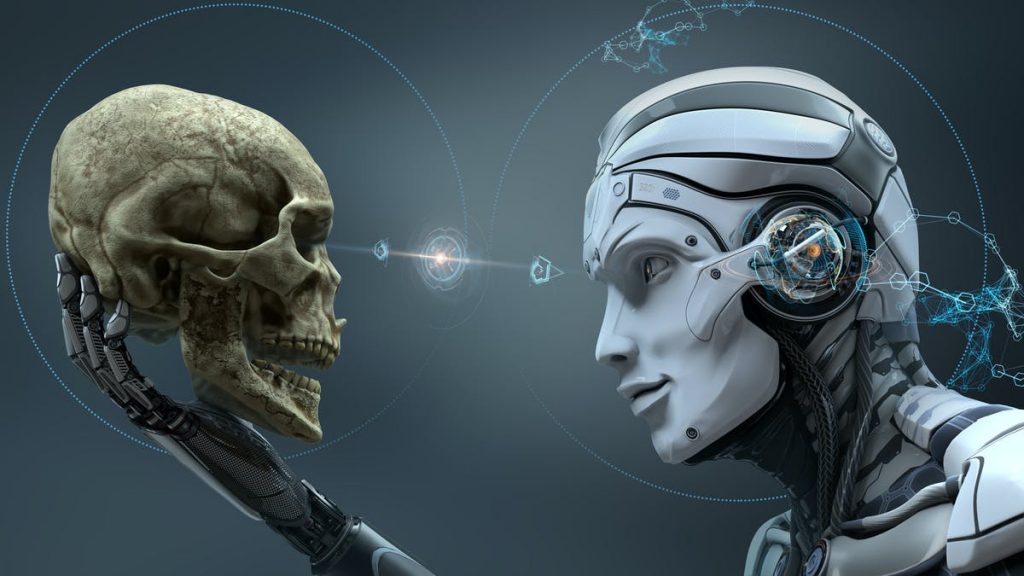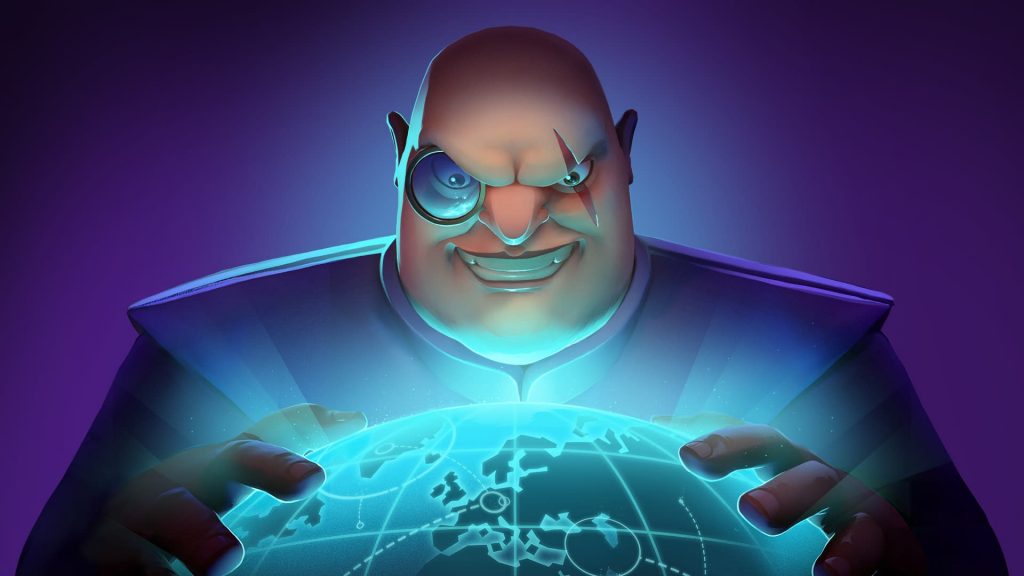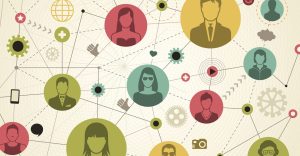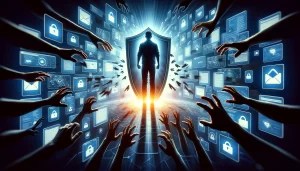“It seems probable that once the machine thinking method had started, it would not take long to outstrip our feeble powers… They would be able to converse with each other to sharpen their wits. At some stage, therefore, we should have to expect the machines to take control. “
This famous quote of Alan Turing had already sparked the discussion about machines controlling humanity, only a few years after the very first mechanical computer was invented, and ‘thinking machines’ were still very far from reality. Now, some 70 years later, AI is progressing faster than anyone had ever imagined possible, and the ‘machine thinking method’ has good and well started. As Turing says, it will not take long for the learning machines, or Artificial Intelligence, to outperform humans (in some fields, they already have). We have to consider the rest of his words carefully; we should expect the machines to take control. This has been the plot of many many books and movies (Terminator, anyone?), and is a big concern of many folks in AI technology; Elon Musk for example is famously trying to stop an AI takeover from ever happening. But the question is not if we can stop AI from taking over; it’s whether we should stop AI from taking over.
Our current system is broken
Have you ever looked at a big world problem, and thought “surely we could solve that, why hasn’t it been done yet?” Take for example global warming. It has been clear for over decades that the influence that humans have on the ecosystem of the world is causing the planet to heat up. This has disastrous consequences for plant, animal, and human life. We have known this for decades, and there still hasn’t been done enough to halt the warming of the earth. Even worse, in the past four years, a certain president of a certain big country has done all he could to negate climate deals and progress. Climate change is a problem that could have been solved a long time ago, if we weren’t so bad at long-term planning. Sure, it costs a lot of money to invest in clean energy, or to build new nuclear facilities so we don’t have to rely on fossil fuels anymore. But, when thinking about it, it’s definitely doable. And the fact that we haven’t massively stopped using fossil fuel yet, has only one reason; humans are greedy. We don’t look at the long term; we look at what’s good for us now, and screw the ones that come after us and inherit a scorched, miserable earth.
So why are our leaders not doing anything about it? That’s because democracy is slowly failing. Populists are rising in the polls in many countries, due to propaganda, fake news, and blind unwillingness of their followers to see the harsh truths. Countries are going backwards, even; Poland has practically made abortion impossible, and China seems to have decided that allowing free speech and open communication is still worse than infecting the entire world with a deadly virus. The United States are deeply divided and civil war isn’t that far-fetched, Russia is so scared of hosting a real democratic election that they’re poisoning and/or jailing everyone that dares to go up against their leader in elections; North Korea is going to have to fight hard to keep their ‘worst country’ title. Even in the Netherlands, our politicians seem to be divided and corrupt, and bickering amongst themselves constantly.
What’s wrong with democracy? The general idea behind it is great, so why isn’t it working? We’ve identified three key reasons why things go wrong. First up – short-term thinking. Most democratic chosen leaders are only in office for a limited time (often less than five years), and this causes a constant cycle through different leaders and parties. With new leaders every few years come new policies, while old policies are discarded; new deals are made, and old deals are broken. This cycle continues ever onward, disrupting long-term planning and teamwork amongst countries. Moreover, politicians are incentified to focus more on short-term goals, and less on long-term ones; they have to convince people to vote for them every few years, and that’s a lot easier to do with a quick fix that solves the problem for now, while that can ultimately undermine the long-term planning.
Secondly, it’s easy to pick leaders who are in actuality not really qualified to rule. To succeed in politics, you have to be a smooth talker, with lots of charisma to win over the voters for you. But while not entirely unimportant, those are not the main characteristics a ruler should have. Compassion, high intelligence, and a willingness to listen to others, should be valued more. However, the rise of populism in many countries shows that often, we choose our leaders based on the wrong reasons. And this ties in well with our last reason why democracy doesn’t work:
Frankly, people are quite stupid beings. Well OK, that’s maybe a bit harsh to say, and not entirely true. A better way to phrase it would be, people are uninformed. Most people don’t watch endless debates, read through pages and pages of stances of the different people/parties up for election. In the Netherlands it’s quite popular to take a quiz to determine which party you should vote on, while in the U.S.A. a lot of people just vote for whichever party their family has voted on for generations. Especially with the rise of fake news, this problem will only become larger; when even the people who want to stay informed don’t know what is true and what isn’t, it will be impossible for people to be fully informed about the issues they are voting on.
While democracy sounds good on paper, in the long run it is a flawed system, one we should look to change if we ever want to reach those lofty ideals of world peace, and an end to hunger and disease.
Human leaders are the worst
“Well”, we hear you say, “at least it’s a better system than countries that don’t have democracy.” And that’s a fair point! North Korea for example is famously under a totalitarian dictatorship, and it’s not going very well there (for the average person, that is; we assume Kim Jong Un doesn’t have it bad). While Russia claims that they’re democratic, Putin makes sure any real competitors are swiftly taken care of, and the country is not faring very well for their citizens, since a lot are living in poverty (although the Russian government doesn’t seem to believe that themselves). Current examples like this, and hundreds of examples from history show us that dictatorships (and monarchies) often result in the leaders faring extremely well, while the average person suffers.
Why does this happen? For one very simple reason. Humans can be dreadfully selfish. We’re easily corrupted by power, and often put our own needs before those of others. That’s not always a bad thing – putting yourself first is in nature necessary for survival, so we’re basically programmed to do so – but in a leader, being selfish is an unacceptable trait. The more power you have as a leader, the more perfect you have to be in order to be a good leader. And in order to unite the world under one leader, that leader has to be absolutely flawless.
So let’s say we find that one flawless person. That perfect leader, incorruptible, completely selfless, brilliant, charismatic. If he’s human, he will die someday. And we have to find a replacement. We have to get it right every time; one bad apple spoils the entire system. If we install a bad world leader once, the world will fall back into chaos. And can we ever get out of that chaos again? With the right programming, regulations, and accuracy, we see a solution to get it perfectly every time.
AI leaders are the best
Having AI as a world governing body is actually a good idea, and this is why! First of all, they’re immortal. So you only have to build one good system; they’re not like humans that have to be replaced constantly. Everytime another leader is replaced you will need to basically start from scratch again, when someone has a different point of view on how to rule. With an AI that is built correctly, so incorruptible, selfless and brilliant, it doesn’t need to be replaced but only upgraded with the evolving technology. Therefore, you would no longer have the problem of having to replace your leader every so often, with the risk of getting it wrong.
Furthermore, with each upgrade it will be able to reach levels of intelligence never before attainable for humanity. Decisions and tasks can be done far more quickly and effectively than any human could do; no more endlessly ongoing debates, far stretched opinions, or trying to convince one another of our own flawed standpoints.
Thirdly, humans will sometimes undertake extreme measures by bribing or making deals to convince large groups of their words and attain great power. Humans are greedy and will go to long lengths in order to get things the way they seem best (for themselves). An AI can be programmed to not have that problem, and to always keep what’s best for society as the highest goal.
But that begs the question; what is best for society anyway? Are there any rules that are good for everyone, can we all agree on what is important and what is not? Probably not, however, there are a few things that everyone can agree on; basic human rights, more equality, and big problems like global warming and pandemic prevention. The rest is a bit more difficult, but difficult problems like these are exactly the kind of problems where AI with far greater intelligence and problem-solving powers than us would shine!
It’s in everyone’s best interest that AI rules humanity and specifies exactly what must happen for humans to thrive. Let’s face it, free will is overrated (and probably doesn’t even exist anyway) when all it does is makes us happy on the short term, instead of the long run. And sure, there are a lot of possible dangers that having an AI system as world leader could bring. People with the wrong intentions could be able to find a backdoor in the system and therefore take it over. They can abuse the AI for manipulation to enact themselves as the world leader and enforce their own bad ideas. Or the makers could program it with their own biases, whether on accident or on purpose, where the AI will recognize patterns based on these preferences and will teach itself to act differently towards one group of society than towards another. But these ‘maybe’ dangers that an AI leader would bring is way less than the ‘for sure’ dangers that being ruled by humans pose.
But surely we could never build a system that complex? An AI that can’t be influenced by corruption, completely selfless, brilliant and charismatic, and always has the best interest for humanity. Well – we might be able to do so, and probably earlier than we think, with the speed general technology, and AI technology, has processed over the past 100 years. This might not be an option for the next decade, and maybe not even for the next century (although we might already reach AI singularity in the upcoming 10-25 years), but we’ll get there. Let’s pray it will be in time to save us from ourselves. All hail our AI saviours!



